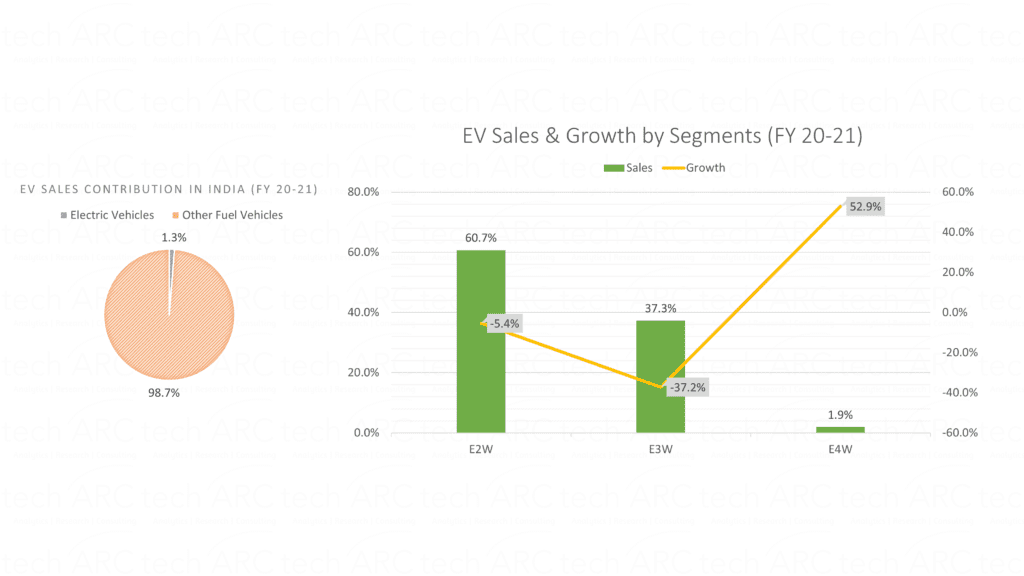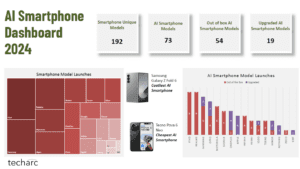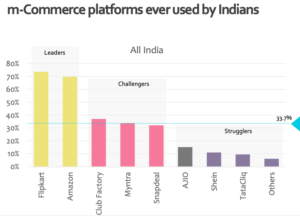1.3% of vehicles sold in India during FY 20-21 were Electric Vehicles.
Gurugram, Friday, April 30, 2021 – In its first report on Electric Vehicles (EVs) for India market, techARC today said that the promotion of EVs in India will lead to a double positive impact on the Trade Deficit of India.
Releasing the key insights, Faisal Kawoosa, Founder, techARC said, “EVs are uniquely positioned which can impact the Balance of Trade in two ways where it not only can reduce the imports of electronics used for manufacturing EVs through domestic production but more importantly help reduce the oil imports making India AtmaNirbhar in energy (fuel).”
“The government of India must reprioritise focus areas in Make in India as local sourcing of other electronics products like Smartphones, Smart TVs, Laptops, etc., would only impact the electronics imports against the EVs where it also helps to reduce the oil imports,” Faisal suggested.
The report highlighted that India imports crude oil over $100 billion a year, of which 47% is used for passenger cars and trucks alone. India is the 3rd largest importer of crude oil, importing over 84% of its total crude oil requirements. EV adoption will help reduce reliance on fossil fuels hence positively impact the Balance of Trade by reducing the trade deficit.

Key Market Trends
- India sold 2,36,803 Electric Vehicles in FY 20-21, which is 1.3% of the total vehicles sold during the period.
- E2W (Electric 2-wheeler) segment contributes 60.7% of the sales. While E2W and E3W, both saw a decline in sales primarily due to macroeconomic sentiments hurt by Covid-19, E4W (Electric 4-wheeler) segment registered 52.9% growth in sales over FY 19-20. During the period, 4,588 E4Ws were sold in India. The growth in E4W was also registered due to Fame-II scheme which provisions for electric buses for various states.
- There are over 10 models of EV passenger cars available in India for consumers to buy in the price range of Rs 9.5 Lakh to Rs 25 Lakh. To substantially see the growth of EVs in passenger car segment (E4W), car OEMs need to bring in affordable offerings in the range of Rs 5-10 Lakh.
- The charging infrastructure is growing in India. At present there are estimated 1,300 plus charging stations in India. However, for mass adoption of EVs this needs to exponentially grow. Private real estate developers can play a key role in expediting growth of charging stations.
- To give further impetus to the growth of EV manufacturing in India, Fame-II scheme requires certain interventions / relaxations especially after the pandemic (covid-19) challenge. For instance, achieving 50% localisation is a challenge.
Garvita Madan, analyst AutoTech at techARC highlighting further the insights of the report, said, “Besides the economic benefits EVs accrue, they contribute significantly in containing the air pollution. 27% of the air pollution is due to vehicular pollution.”
About the Report
The report captures comprehensive insights and information about Electric Vehicles in India which makes it a single source of all the relevant information about the market. Some of the key discussion points of the report include: –
- Evolution of EVs worldwide.
- Global Update on EVs.
- Leading OEMs worldwide.
- Growth drivers for EVs.
- EV journey in India.
- Sales of EVs and the segment trends.
- Major OEMs in India.
- Passenger EV vehicles available in India.
- Policy interventions helping growth of EV manufacturing in India.
- State government policies to promote sale of EVs.
- Economic implications of growth of EVs in India.
- Challenges of EV market in India.
- Recommendations for growth of EVs in India.
Contacts
For industry queries please write to research@techarc.net
For media queries, please write to media@techarc.net










1.3% of vehicles sold in India in FY 20-21 were EVs | TechCodex
May 4, 2021[…] Source […]
1.3% of automobiles bought in India in FY 20-21 have been EVs – The Arizona Times
May 4, 2021[…] Supply […]